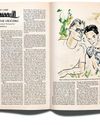Essayer OR - Gratuit
What Happened To The Yuppie?– In 1979, an article by Blake Fleetwood in the Times Magazine reported a surprising phenomenon: young people were moving to big cities
The New Yorker
|July 29, 2024
Tom McGrath's "Triumph of the Yuppies: America, the Eighties, and the Creation of an Unequal Nation" (Grand Central) is an entertaining recap of that period. McGrath doesn't offer a novel sociological interpretation of the yuppies. What he has to say about them would have been conventional even during their time.

In 1979, an article by Blake Fleetwood in the Times Magazine reported a surprising phenomenon: young people were moving to big cities like New York, Philadelphia, and Baltimore. This was news because America's metropolises, New York especially, had been given up for dead, gutted by white flight, a deteriorating economic base, and financial mismanagement. In the nineteen-seventies, New York had lost eight hundred thousand people, ten per cent of its population. Yet the evidence suggested, Fleetwood wrote, "that the New York of the 80's and 90's will no longer be a magnet for the poor and the homeless, but a city primarily for the ambitious and educated an urban elite." It was an uncannily accurate call.
Those "ambitious and educated"gentrifiers were the young urban professionals, the yuppies. The term first appeared in print in 1980, in a Chicago magazine piece by Dan Rottenberg. Rottenberg said that he had heard the word being used around Chicago, possibly in real-estate circles, but, wherever it came from, "yuppie" was an inspired coinage, in an etymological line of descent from "hippie," "Yippie," and "preppie," a similarly irresistible neologism.
After the word appeared in a Chicago Tribune column by Bob Greene, in 1983, "yuppie" took off. (Greene, too, claimed that he had heard it from someone else.) The column was syndicated in two hundred newspapers, and, overnight, the world turned yuppie. Gary Hart, running for President in the Democratic primaries, was the yuppie candidate. Jay McInerney's "Bright Lights, Big City" was the yuppie novel. Lawrence Kasdan's "The Big Chill" was the yuppie movie. Madonna's "Material Girl" "The boy with the cold hard cash/Is always Mister Right"-was the yuppie anthem.
Cette histoire est tirée de l'édition July 29, 2024 de The New Yorker.
Abonnez-vous à Magzter GOLD pour accéder à des milliers d'histoires premium sélectionnées et à plus de 9 000 magazines et journaux.
Déjà abonné ? Se connecter
PLUS D'HISTOIRES DE The New Yorker

The New Yorker
THE TALK OF THE TOWN
The militarization of American cities, including Los Angeles, Portland, and Chicago, has brought home a perverse irony. T
4 mins
October 20, 2025

The New Yorker
THIS IS MISS LANG
The brief life and forgotten legacy of a remarkable American poet.
19 mins
October 20, 2025

The New Yorker
RAMBLING MAN
Peter Matthiessen's quest to escape himself—at any cost.
15 mins
October 20, 2025

The New Yorker
DEGREES OF HOSTILITY
How far will the Administration's assault on colleges and universities go?
26 mins
October 20, 2025

The New Yorker
GOINGS ON
What we're watching, listening to, and doing this week.
6 mins
October 20, 2025

The New Yorker
READY OR NOT
Zohran Mamdani wants to transform New York City. Will the city let him?
37 mins
October 20, 2025

The New Yorker
Alexandra Schwartz on Joan Acocella's "The Frog and the Crocodile"
When I am stuck on a sentence or trying to wrestle an idea into shape, I turn to Joan Acocella.
3 mins
October 20, 2025

The New Yorker
A BROTHER'S CONVICTION
Did a grieving man's quest for justice go too far?
43 mins
October 20, 2025

The New Yorker
THE KEY TO ALL MYTHOLOGIES
Why the quest for a master code goes on.
13 mins
October 20, 2025

The New Yorker
FOR ART'S SAKE
\"Blue Moon\" and \"Nouvelle Vague.\"
6 mins
October 20, 2025
Listen
Translate
Change font size
